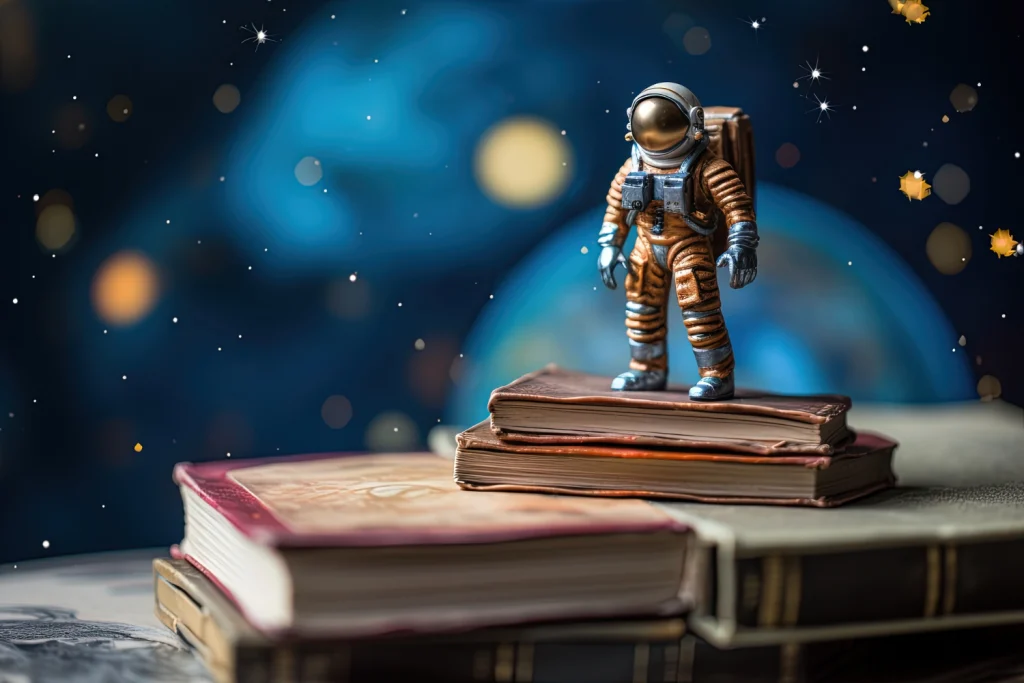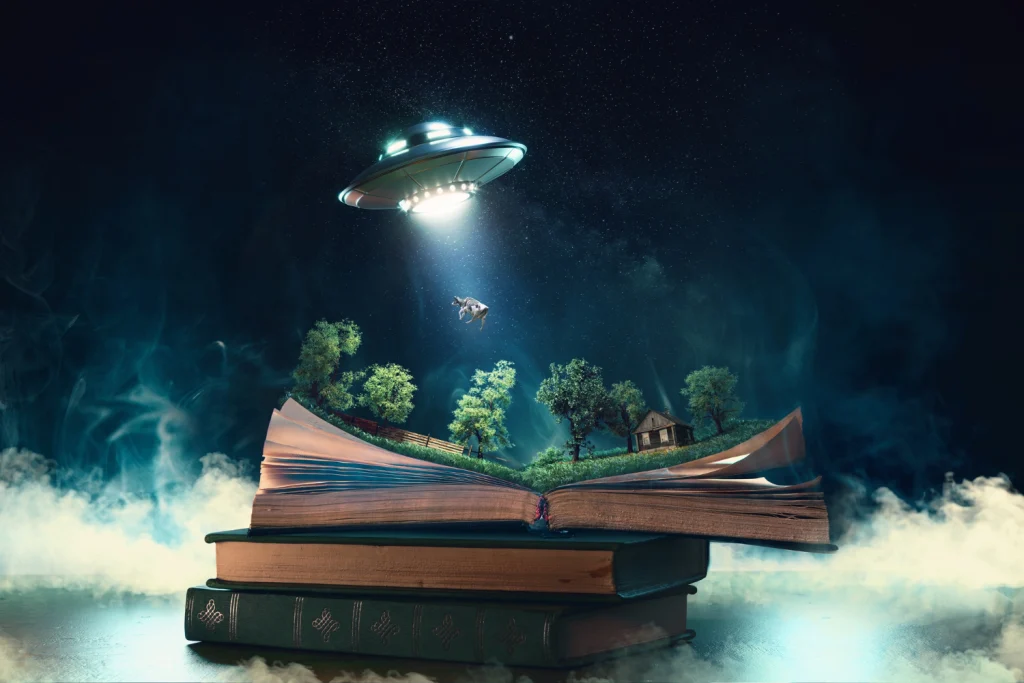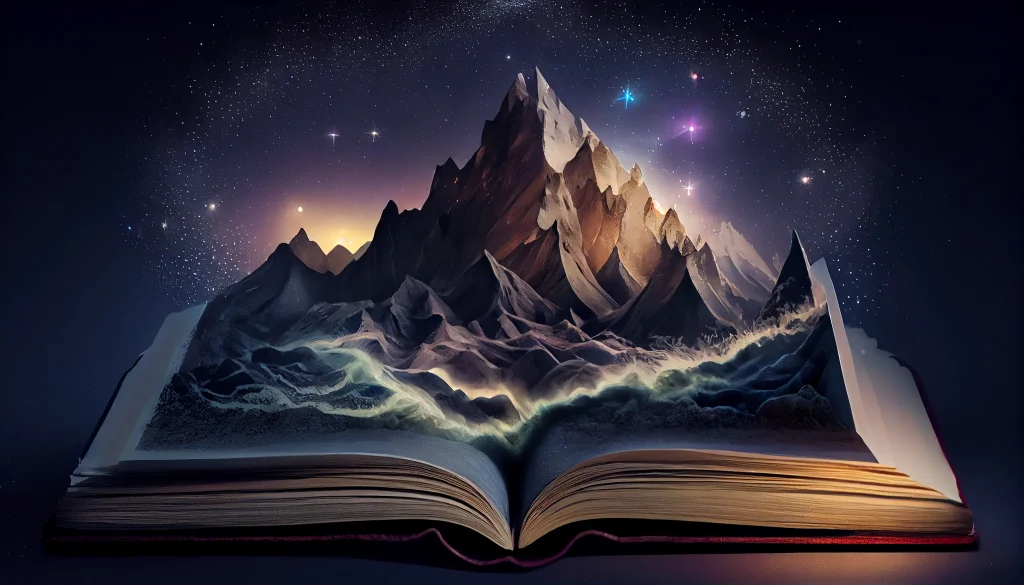Alright, let’s not get fancy here. Science fiction. Two words that get tossed around in bookshops, movie trailers, and nerd debates at 2 a.m. But what is it, really? Is it about rocket ships and bug-eyed aliens? Or is it about time travel machines, robot uprisings, or humans arguing about morality in outer space? Short answer: yes. Longer answer? Well… let’s unpack it, slowly, messily, with coffee stains on the notebook.
- Trying to Pin Down Sci-Fi
- Why the “Science” Part Matters
- Different Flavors of Sci-Fi
- Why Readers Keep Coming Back
- Sci-Fi v. Fantasy: The Never-ending Fight
- How Sci-Fi Shapes Real Life
- Why Authors Write Sci-fi Anyway
- Sci-Fi isn’t All Serious
- How to Start Reading Sci-Fi
- Sci-Fi in Movies and TV
- Why Sci-Fi Matters More Now
- Common Misconceptions
- Final Thoughts
- FAQs
Trying to Pin Down Sci-Fi
Here’s the thing: ask ten readers what the science fiction genre is, and you’ll probably get ten different answers. For one person, it’s Isaac Asimov building rules for robots. For another, it’s Octavia Butler rewriting what humanity even means. And then there’s the crowd who says, “Wait, isn’t Star Wars sci-fi?” (Cue a room splitting in half — half saying yes, half shouting it’s space fantasy.)
That’s kind of the magic. It’s slippery. It’s science and imagination dancing awkwardly together at prom. Sometimes it’s grounded in real physics. Sometimes it’s completely bonkers, with wormholes that act like cosmic elevators. But always, it asks a big “what if?”

Why the “Science” Part Matters
People sometimes complain: “But this book had dragons, isn’t that fantasy?” Well, if those dragons are explained with DNA splicing and lab experiments, then guess what — we’ve crossed into science fiction land.
Sci-fi doesn’t have to be accurate to NASA standards, but it plays with the idea of possibility. Like, sure, maybe we don’t have teleportation today. But what if? The genre thrives on that “what if.”
Real Example Time
Mary Shelley, way back in 1818, cooked up Frankenstein. No spaceships, no aliens. Just one doctor, one experiment, and a stitched-together guy who wouldn’t stay dead. People call it the first real sci-fi novel because it’s not magic — it’s science gone sideways.
Different Flavors of Sci-Fi
Now, here’s where things get fun. The science fiction genre isn’t one shelf in the bookstore. It’s half the store.
6 Different Types of Sci-Fi
Let’s have a look at the various types:
1 Hard Science Fiction
The “don’t mess with the laws of physics” crowd. Authors here love their math and technical details. Andy Weir’s The Martian made potato farming on Mars feel like a TED Talk.
2 Soft Science Fiction
Less math, more people. Focuses on society, psychology, and culture. Think Ursula K. Le Guin’s The Left Hand of Darkness. It asks: what happens if gender isn’t fixed? That’s sci-fi without endless equations.
3 Dystopian and Post-apocalyptic
You know the drill: the world’s a mess. Technology has backfired, governments collapse, and people scrape by in the rubble. The Hunger Games, Snowpiercer, The Road — all bleak, all sci-fi.
4 Space Opera
Big, loud, dramatic. Whole galaxies at war. Heroes, villains, laser swords. It’s soap opera in space. Fun, flashy, and addictive.
5 Cyberpunk
Neon lights, hackers, corporations running the world, and usually someone jacking into cyberspace. William Gibson’s Neuromancer basically invented the aesthetic we still see in movies like The Matrix.
6 Time Travel and Multiverse
Who doesn’t love a good paradox? Whether it’s H.G. Wells’ The Time Machine or Marvel throwing timelines around like spaghetti, this subgenre asks: what happens if you mess with time?

Why Readers Keep Coming Back
Let’s be real: sci-fi is addictive because it makes us feel two things at once — wonder and unease.
- Wonder, because spaceships! aliens! shiny gadgets!
- Unease, because it often reflects our own world in disguise.
Example: Orwell’s 1984. Sure, it’s “future” fiction. But it’s really about control, surveillance, and politics that look suspiciously familiar.
Sci-fi sneaks philosophy into entertainment. You pick up a science fiction book for laser battles and walk away questioning free will.
Sci-Fi v. Fantasy: The Never-ending Fight
Quick side rant. People mix these two constantly. Yes, they overlap. But here’s the cheat sheet:
- Magic = Fantasy.
- Technology (even fake tech) = Sci-fi.
Dragons born from spellbooks? Fantasy. Dragons designed in a genetic lab? Sci-fi. Easy, right? Until authors mash them together, and then all hell breaks loose.
How Sci-Fi Shapes Real Life
This isn’t just fun storytelling. Half of today’s tech owes its spark to some author’s imagination.
- Cell phones? Star Trek had communicators.
- AI assistants? Hello, HAL 9000.
- Rockets to Mars? Written long before SpaceX.
It’s like sci-fi is the brainstorming room for engineers. Writers dream it, scientists build it (sometimes badly, sometimes brilliantly).
Many aspiring authors are drawn to the world of science fiction but struggle to bring their complex ideas to life. That’s where expert support can make all the difference. Discover why authors choose fiction ghostwriting services to transform imaginative concepts into powerful stories that captivate readers.
Why Authors Write Sci-fi Anyway
Because it’s freedom. You want to critique the government? Set it on Mars. Want to talk about climate change? Flood the Earth in your story and call it 2125. Want to explore identity? Make an alien culture mirror our struggles.
Basically, a science fiction book gives authors a mask. Behind the lasers and robots, they’re often yelling about real human problems.
A Little Anecdote
Someone once said they got hooked on sci-fi after reading Ender’s Game in high school. At first, it was “cool, kids in space learning battle strategy.” Years later, they re-read it and saw the moral weight, the manipulation, the politics. That’s the trick: sci-fi often grows up with you.
Sci-Fi isn’t All Serious
Don’t think it’s always grim and lecture-y. There are hilarious, absurd gems like Douglas Adams’ The Hitchhiker’s Guide to the Galaxy. A depressed robot, a towel as survival gear, and a bureaucratic space government. It’s a comedy wrapped in cosmic nonsense, and it’s still sci-fi.
How to Start Reading Sci-Fi
If you’re new, don’t panic. You don’t have to start with a 900-page epic.
Tips:
- Pick something fun (Hitchhiker’s Guide or Ready Player One).
- Try classics to see where it all started (Frankenstein, The Time Machine).
- Explore modern hits (Project Hail Mary, The Expanse).
No rules here. Jump around until you find your flavor.
Sci-Fi in Movies and TV
Let’s be real, books aren’t the only place sci-fi thrives. Star Trek, Star Wars, Black Mirror, The Expanse, Marvel’s multiverse…the list is endless.
Movies and shows sometimes water things down, but they’ve also pulled millions of new fans into the genre. Someone watches Blade Runner and then picks up Philip K. Dick. That crossover matters.
Why Sci-Fi Matters More Now
2025 feels like a sci-fi novel already. AI is writing essays, billionaires are shooting rockets into space, and climate tech is racing against the clock. The line between “fiction” and “news headline” keeps blurring.
Sci-fi helps us process that chaos. It’s a rehearsal for futures that might actually happen. Even the wild stuff plants seeds in our imagination.
Common Misconceptions
- Sci-fi is only for nerds. False. Everyone watches movies with sci-fi elements (Marvel, anyone?).
- It’s all about tech. Nope. It’s about people reacting to tech.
- It’s always serious. Definitely not. Plenty of sci-fi is funny, weird, or downright silly.

Final Thoughts
So, what is a sci-fi? Depends on who you ask. A playground for ideas. A mirror dressed in laser beams. A prediction, sometimes right, sometimes hilariously wrong.
Honestly, it’s whatever sticks in your brain after you close the cover. Could be fear, could be awe, could be a robot joke you tell your friends.
If you’re new, grab one. Anyone. Flip pages. Don’t worry about “getting” the genre. Nobody agrees on a single definition anyway, and that’s kind of the point. Sci-fi is the conversation that never ends. And maybe, just maybe, that’s why we keep reading.
Got a wild sci-fi draft sitting in your docs, waiting for liftoff? Don’t let it gather space dust. Pixel Writing Studio turns messy words into market-ready books. Contact us today and launch big.
FAQs
Q1: Is every book with spaceships considered science fiction?
Not really. Spaceships help, sure, but it’s more about the ideas. If the story explores “what if” through science or tech, then yes, that’s sci-fi territory.
Q2: What’s the difference between sci-fi and fantasy?
Easy trick: if the “magic” is explained by science or tech, it’s sci-fi. If it’s just spells or dragons without science, that’s fantasy. Sometimes, they overlap.
Q3: Do science fiction books have to be realistic?
Nope. Some are hyper-accurate with physics, others are completely wild. What matters is the logic inside the story world. Readers accept rules, even if those rules are bonkers.
Q4: Why do authors write science fiction instead of realistic stories?
Because sci-fi lets them explore tough themes safely. It’s easier to talk about politics, identity, or climate change when the story happens on Mars or in 2125.
Q5: Is science fiction only about the future?
Not always. Sure, many explore future tech, but others play with alternate histories or “what if” twists on today. It’s less about “when” and more about “possibility.”